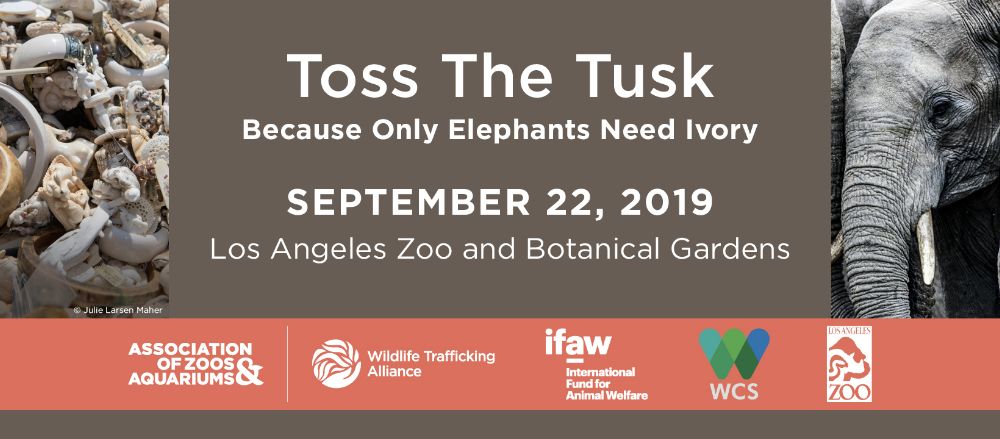
L.A Zoo Kicks Off National Campaign To End Illegal Wildlife Trafficking By Bringing Attention to Urgent Elephant Poaching Crisis With Public Drop-Off Event
The L.A. Zoo announced its participation in a national campaign to surrender ivory with the first “Toss the Tusk” event of the series taking place on Sunday, September 22. The goal of this free public service event is to encourage the Los Angeles community to join in the fight to save elephants from wildlife trafficking. “Toss the Tusk” gives the public a direct opportunity to safely dispose of their ivory items, ensuring it will never hold value in the black market. On Sept 22, the public can send a strong signal to the world that that elephants are worth more alive.
Today’s announcement is a significant step forward in the effort to save elephant populations. One elephant is killed approximately every twenty-five minutes to fuel an unprecedented global demand for ivory products. According to the Wildlife Trafficking Alliance and the California Department of Fish and Wildlife (CDFW), the United States is one of the largest markets for these products, which means that demand from American consumers has a tremendous influence on whether elephants will become extinct within our lifetimes. The U.S. – as one of the largest consumer markets in the world – drives demand for illegal wildlife and wildlife products around the globe, and represents a significant market for these products, including jewelry, clothing, medicine, carvings, souvenirs, household décor, pets, and food.
“Worldwide demand for ivory is decimating elephant populations and supporting international criminal syndicates around the globe,” says Dan Ashe, President and CEO, Association of Zoos & Aquariums. “AZA’s Wildlife Trafficking Alliance is honored to partner with California wildlife officers, leading conservation organizations and AZA-accredited facilities on these important public events. Because demand for ivory products is driving elephants to extinction, consumers hold the key to ending the scourge of wildlife trafficking. By putting our actions in line with our values we can work together to protect these treasured species for the benefit of our planet, our security, and future generations.”
“We want to get the word out to our Los Angeles community that ivory is illegal to buy or sell,” says Los Angeles Zoo Director Denise Verret. “I’m sure there are plenty of L.A. residents who happen to have ivory items that have been passed down from generation to generation. Toss the Tusk at the Los Angeles Zoo is an important national campaign with global goals. On the 22nd, Angelenos will have a convenient place to safely and legally dispose of ivory products while directly helping animals, providing our community a sense of value and purpose.”
Wildlife officers from CDFW will be present alongside L.A. Zoo officials to collect the items. The surrendered ivory will then be transported to the California Department of Fish and Wildlife to be used for educational and scientific purposes. All collected items will first go to the CDFW Wildlife Forensics Laboratory in Sacramento to see if any genetic data can be gathered. Some of the products may end up as training aids for wildlife officers to refine ivory identification skills and some will help train K-9 members of the CDFW law enforcement K-9 program in ivory detection.
“The CDFW welcomes all ivory goods and wildlife parts. Our K-9 officers will be using the ivory for training and our Wildlife Forensics Laboratory will be studying these animals’ genetics in order to help wildlife officers make future cases,” says Nathaniel Arnold, an Assistant Chief in the CDFW Law Enforcement Division, who will on-hand at the L.A. Zoo event. In addition to the drop-off activity, L.A. Zoo is also presenting a first-ever “Toss the Tusk Learning Expo” located just inside the zoo, free with general admission. Here, zoo guests will have the rare and exciting opportunity to speak with local, state, and national experts and CDFW wildlife officers, the Wildlife Trafficking Alliance (WTA), and the national Association of Zoos and Aquariums (AZA). The CDFW canine ivory detection unit will be present as well as displays of illegal and confiscated wildlife goods to encourage education and dialogue about solving the illegal trade problem. According to the CDFW, accruing a collection of ivory helps train wildlife officers to differentiate between walrus, hippo, rhino, elephant tusks and horns.
“Wildlife trafficking has quickly escalated into a multi-billion-dollar criminal industry, ranking as the fourth most profitable transnational crime, only behind the drug trade, arms trade, and human trafficking,” says Arnold. “We want to be clear: possession of ivory or rhino horn is not illegal. These citizens are not turning in contraband. Ivory and rhino items that have been in a family collection for generations, items lawfully acquired from states where it is legal to buy and sell, and items from otherwise lawfully acquired origins are all legal to possess. The 2015 law makes it illegal to buy, sell, and trade ivory and rhino horn – that is the criminal activity our wildlife officers stop.”
Nationwide ivory surrender events are being organized by the Association of Zoos and Aquariums (AZA)/Wildlife Trafficking Alliance (WTA), with support from the International Fund for Animal Welfare (IFAW) and the Wildlife Conservation Society (WCS), longstanding leaders in conservation.
